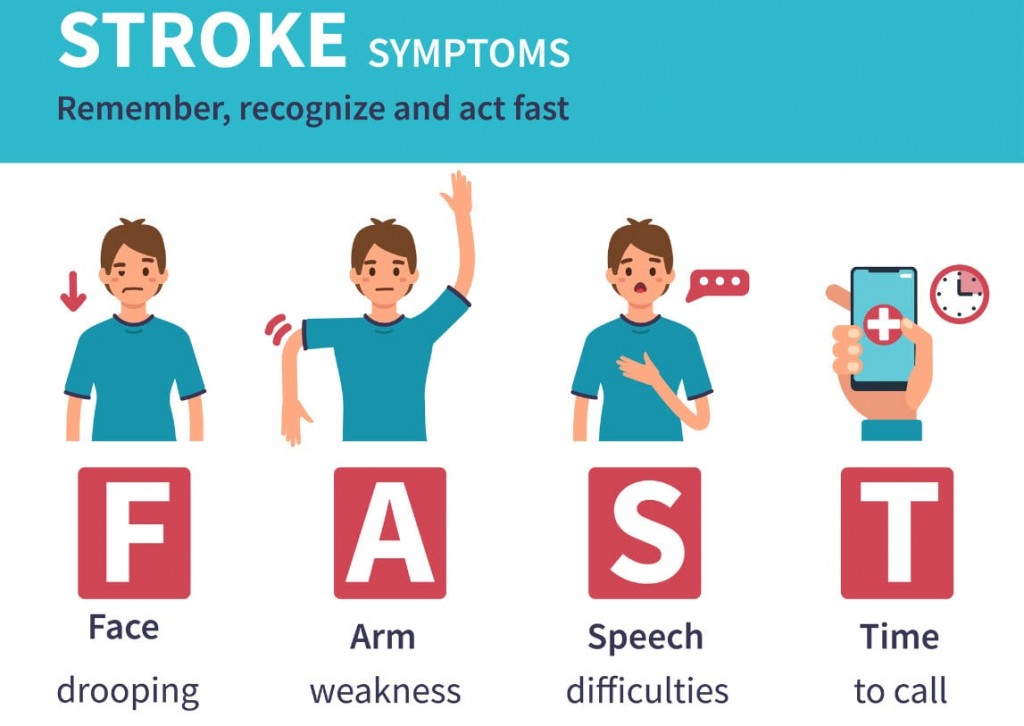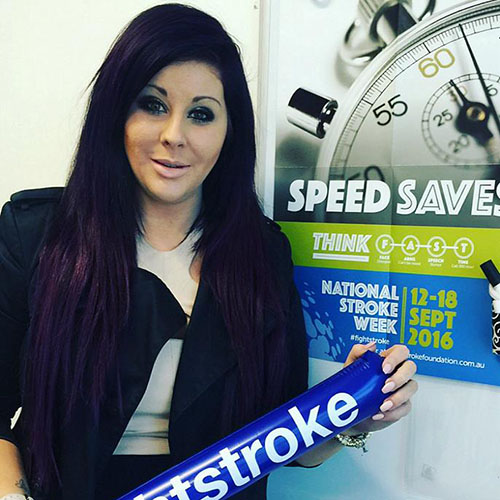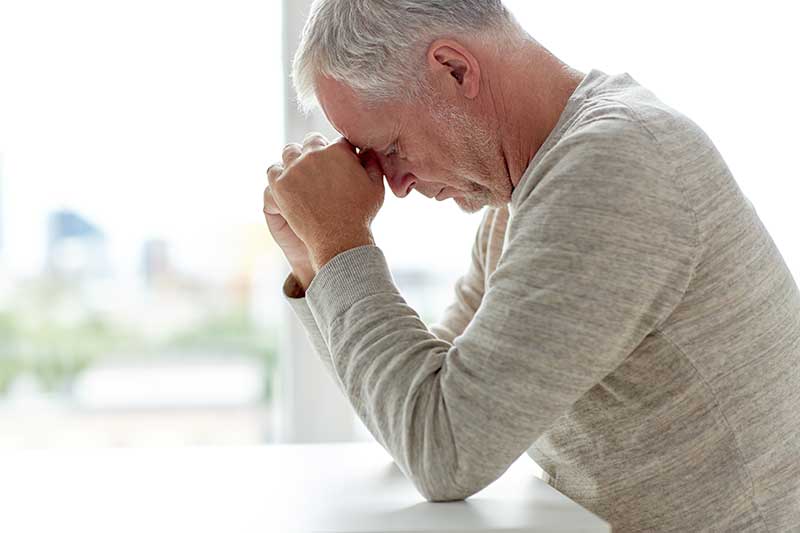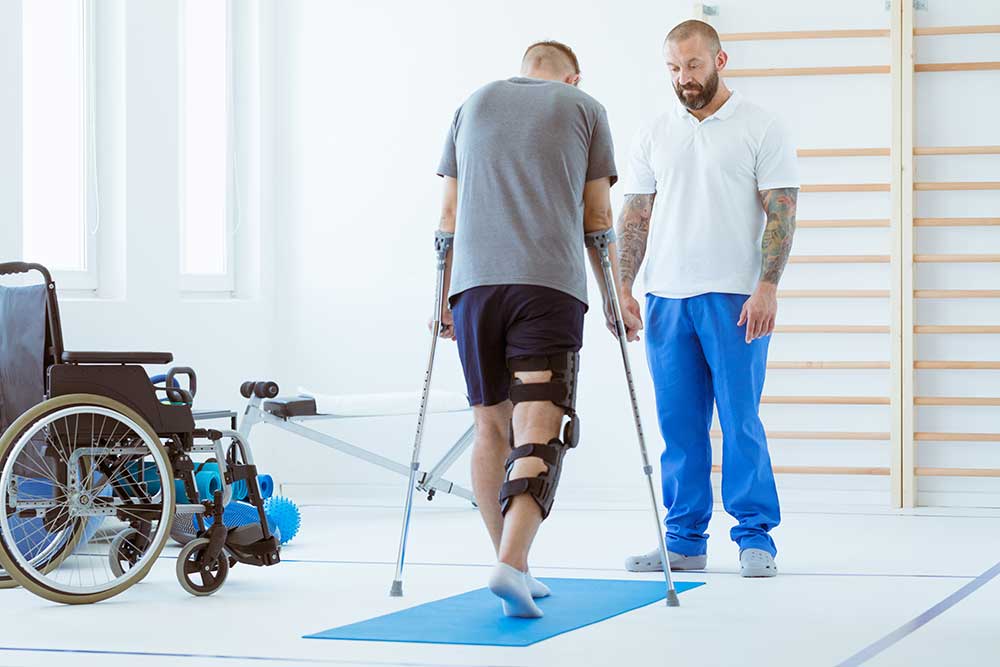My name is Emma, and I had just turned twenty nine, two weeks before my stroke. I had just got home from work and served my children their dinner. I sat down to watch TV and noticed there were spots in my vision, just like the spots you get from staring at the sun or light.
I thought to myself that it was slightly strange, but I was convinced it would go away at any second. When I realised it wasn’t going away I said to myself “this is definitely strange”. I hadn’t been looking at any light and it seemed to be getting worse, and it began to annoy me that I couldn’t see all of the TV – I was even annoyed that I was missing a good part.
It suddenly dawned on me that it wasn’t normal, I got worried and called ’13 HEALTH’. To ask what it could be. I was still torn between ‘it’s nothing and something is seriously wrong.
As I was speaking to the nurse I noticed my hand feeling strange and told her, I was still holding onto the belief that I thought it was just mind over matter and said “I’m fine”.
The nurse said straight away “I’m connecting to an ambulance – just stay on the line”. I was still telling her “I’m fine, I don’t need an ambulance” and still wondering about my vision. I was told sternly “no those symptoms aren’t good”.
The ambulance team spoke to me asking me to give my details. I gave them, but I couldn’t remember my phone number. I knew this was strange, but thought maybe I’m a bit panicky with everything going on.
My only focus after that was remaining calm, to not alarm my children, or for them to see the ambulance. I didn’t want them to be anxious, especially as my eldest son, as he is familiar with tragedy – I didn’t want him ‘freaking out’.
I went out to the garage to wait for the ambulance to arrive. When we heard sirens in the distance I quickly said goodbye to their dad, and said “I will be back shortly” I was still thinking and believing I was fine.
Ryan closed the garage door.
I stood on the drive-way and as the ambulance approached, I began to walk the short distance to the end of the drive-way. I took a few steps and as I looked down, I noticed I was walking diagonally. As I looked up I saw one ambulance officer coming out of the slide door of the ambulance, and another one jumping out of the front. Then I collapsed.
I was confused, I remembered the officer grabbing me and yelling to the others ‘I think this is our patient’ – I remember feeling strange, like an out-of-body feeling.
I had some comprehension, and I knew what was going on, but at the same time was unable to construct the words to communicate. It’s like I couldn’t control anything, I felt like my intelligence and thoughts had been robbed. I remember thinking they must think I’m normally like this because they don’t know me.
When I woke up I realized I couldn’t use my arm, and my speech sounded different. I was petrified.
The doctors weren’t telling me much, although they talked about stroke and used all sorts of words I didn’t understand, they talked amongst themselves. The doctors told me they were waiting to speak to the specialist neurologist, and asked me if I had my family coming? They would talk to me soon.

I still was thinking it would be nothing serious. I found the MRI scan, as it was next to my bed. I had a look and found it said ‘confirmed: CVA’. I thought yay, it’s not a stroke. It is something else, and probably nothing bad. Little did I know that CVA actually meant stroke!
The medical team came back with a specialist doctor and explained to me that I had a stroke, and explained where in my brain I had had it. They gave me some resources, and explained the medication they had given the night before. Medication that I’m on for life.
I was in total shock. I asked if I will see properly again and get movement in my arm back. The doctors explained they were unsure, and can’t tell with a brain injury. You have to wait and time will tell. If it starts to improve that means it is more likely to be able to make a full, or near full recovery. They said I may never be back to 100%.
Words can’t describe that sinking and heart aching feeling. I felt so sad, and sorry, as the next day was my Dad’s birthday – he would have to hear this news on his special day.
I was given further tests to find a cause, and they found that a blood clot had gone the wrong way from a hole in my heart, into my brain.
I continued with rehab with the help and support of my stroke nurse and team, and at first I had little hope. Then I began to learn to do things with my left hand, and it was my son and daughter that were the biggest heroes. They would encourage me to colour and draw with them to ‘wake up mummy’s hand’, as we’d explained to my 5 year old, that my hand was just sleeping. Over time, dedication and hard work, it got better and better; improving strength – and I now pretty much have it completely back.
I find the biggest struggle in my day-to-day life is the tiredness and my memory loss. It’s not the ‘it’s been a tough week at work’ tiredness. Nor the have a glass of wine to ‘get on with it’ or the ‘have a strong coffee and you’ve got this’. And you can’t fix it with an attitude of no-one will know I’m stressed. Nope, this tiredness comes on suddenly, where ever you are, and literally, completely wipes you out.
The feeling makes ordinary things difficult, if not impossible to do. Simple things like writing or having a conversation; deep thinking and any intelligent thinking required at work is – impossible.
I feel like I’m trapped inside my own head, and it is entirely exhausting. It’s non-negotiable and utterly unshakeable. I want to retreat away from society in fear of people not understanding. It must be difficult for people to understand when looking at me, you can’t see the cause it is hidden. You can’t see the damage to my brain, it is not self-evident when I’m doing something and literally forget what I am doing, or why I am there or what is happening. Doctors call it cognitive fatigue and tell me there is no treatment or cure.
Four weeks after my major stroke, I had a minor one caused by remnants of clotting from the previous stroke, and a seizure, which can happen in around five per cent of stroke survivors.
So then came a lot more testing, an increase of medications, and heightened emotions. Doctors keep telling me how lucky I am and how important it was that I got to the hospital so early. I received thrombolysis treatment.
They described the procedure used to break-down the clot to prevent further damage. I educated myself and found out more about the F.A.S.T mnemonic. Why speed and time is so important, as well as constantly being reminded that ‘you’re so young to have a stroke’ by everyone.
I learned that stroke one of Australia’s biggest killers, it kills more women than breast cancer, and more men than prostate cancer!
I am so grateful to the ambulance officers, paramedics, 13Health, hospital staff and the stroke rehabilitation teams – I now realise I am truely “lucky in an unlucky way”.
Emma
Shared from the Stroke Foundation website





Customer Reviews
Thanks for submitting your comment!